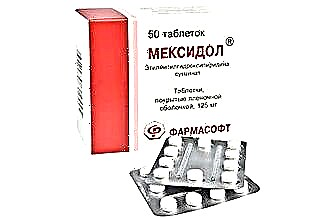The appearance of tinnitus is not a favorable sign. If this symptom is pronounced and does not stop on its own for a long time, it should be regarded as an "alarm signal". Ringing tinnitus can be noted by patients of any age, and the causes of its occurrence are quite numerous. The main thing to be afraid of when an obsessive sound appears is a progressive decrease in hearing acuity, which is observed in case of damage to the auditory nerve. It is very difficult to help preserve hearing function even with timely treatment, so the ringing cannot be ignored. The development of cochlear neuritis can be sudden for the patient - the disease can appear as a complication of the common cold.
Causes

Constant ringing in the ears is a significant symptom of cochlear neuritis that should be monitored. Cochlear neuritis is understood as a non-suppurative ear disease, the development of which is based on damage to the auditory nerve. There are disturbances on the part of the sound-perceiving system (while the structures of the sound-conducting system may not be affected), there is a decrease in hearing acuity, that is, the phenomenon of hearing loss.
If you are constantly ringing in your ears, the reasons may be different. Cochlear neuritis can be provoked by:
- Infectious factors.
- Toxic factors.
- Traumatic factors.
- Occupational hazards.
- Age-related changes.
Cochlear neuritis can be detected as a complication of various infectious diseases - influenza, scarlet fever, mumps, meningitis, syphilis, etc. The greatest risk arises in severe cases and in the absence of adequate therapy. Sometimes hearing loss and tinnitus appear after a cold - since this disease is provoked by a large number of infectious agents, it is not always possible to confirm the etiology. In addition, the opinion about the relative "safety" of the common cold in comparison with other pathologies often leads to refusal of treatment. Thinking about why it is constantly ringing in the ear, one cannot exclude the possibility of complications of the infection.
Among the toxic factors leading to what often rings in the ears are household and industrial poisons (salts of heavy metals, oil refined products, etc.), medications. Intoxication with toxic substances of domestic and industrial origin is observed infrequently, mainly due to violation of safety rules, emergency situations at work. The leading cause of persistent tinnitus due to  the development of cochlear neuritis is the use of ototoxic pharmacological agents. These include drugs from the aminoglycoside group (Streptomycin, Gentamicin, Monomycin), diuretics (Ethacrynic acid and its derivatives), alkylating agents (Cisplatin). In this case, the age of the patient matters - for example, taking antibiotics with an ototoxic effect is most dangerous for children of the younger age group.
the development of cochlear neuritis is the use of ototoxic pharmacological agents. These include drugs from the aminoglycoside group (Streptomycin, Gentamicin, Monomycin), diuretics (Ethacrynic acid and its derivatives), alkylating agents (Cisplatin). In this case, the age of the patient matters - for example, taking antibiotics with an ototoxic effect is most dangerous for children of the younger age group.
Alcohol and nicotine have a toxic effect on the auditory nerve.
The traumatic genesis of cochlear neuritis is spoken of in acoustic trauma. It occurs as a result of exposure to a very loud sound - for example, after a shot near an organ of hearing. Constant ringing in the ear requires immediate treatment.
Exposure to noise, leading to the development of cochlear neuritis, is most pronounced when working with aircraft, mining, metallurgy, blacksmithing, and other areas that require continuous contact with loud sound sources. At the same time, it constantly rings in the ears, but hearing decreases gradually, and patients may not seek medical help for a long time.
Why do older people constantly ring in their ears? In many cases, age-related changes are observed in patients over 60 years of age, which are defined by specialists as "wear and tear of the nervous tissue." The process is steadily progressing, but it is characterized by a slow gradual development. Although the impairment is irreversible, it can be partially corrected with adequate therapy and hearing aids. This helps to reduce the severity of tinnitus.
Therapy tactics
When the ringing in the ear is constantly ringing, what to do? It is necessary to determine the nature of the pathological process. In cochlear neuritis, bilateral lesions are usually observed, however, the option of ear noise appearing only on the left or right side is acceptable - for example, after traumatic exposure. If the diagnosis is confirmed, the following is carried out:
- hospitalization of the patient in a hospital;
- the appointment of detoxification therapy;
- the use of etiotropic therapy for syphilis;
- application of physiotherapy methods;
- consideration of indications for hearing aids.
 Knowing what causes the constant ringing in the ears, you can draw up the correct treatment regimen. However, it is not always possible in a short time to find out the exact cause of the noise and the development of cochlear neuritis. Therefore, complex drug therapy is carried out aimed at improving microcirculation, the activity of metabolic processes. Some experts recommend the use of hyperbaric oxygen therapy in treatment. Also shown is the method of magnetotherapy, electroacupuncture.
Knowing what causes the constant ringing in the ears, you can draw up the correct treatment regimen. However, it is not always possible in a short time to find out the exact cause of the noise and the development of cochlear neuritis. Therefore, complex drug therapy is carried out aimed at improving microcirculation, the activity of metabolic processes. Some experts recommend the use of hyperbaric oxygen therapy in treatment. Also shown is the method of magnetotherapy, electroacupuncture.
The meato-tympanic method of drug administration can be used.
The choice of meato-tympanic administration is due to the need to create a sufficient concentration of the active substance in the lesion. The drug is injected through the fold behind the ear. Also used is the introduction by electrophoresis through the external auditory canal or mastoid process.
If constantly ringing in the left ear, what to do? Otolaryngologists suggest using agents from the group of anesthetics, which are injected into biologically active points in the parotid region, to combat ear noise. This method can be effective in eliminating ringing altogether or reducing its intensity. Often, the use of physiotherapeutic methods, various massage techniques, gives satisfactory results.
Drug therapy
Having found out why the ears are constantly ringing, it is necessary to treat cochlear neuritis. All existing pharmacological agents are most effective at the onset of the disease, when the changes are still at least partially reversible. The following drugs are used:
- Histamine-like (Betahistin, Betaserc).
- Anticholinesterase (Galantamine, Proserin).
- Vasoactive (Pentoxifylline, Piracetam).
- Vitamins (A, E, group B).
- Biogenic stimulants (Apilak).
- Anabolic steroids (Retabolil).
- Detoxification agents (Gemodez, Reopolyglyukin).
The therapy is carried out in courses, repeated if necessary.
If complaints that constantly ringing in the ear appear suddenly and persist for several hours, one can suspect the presence of acute cochlear neuritis in the patient.  The development of the disease is associated with various reasons, in some cases due to acoustic trauma (including work-related). The patient is urgently hospitalized in the otolaryngology department, used:
The development of the disease is associated with various reasons, in some cases due to acoustic trauma (including work-related). The patient is urgently hospitalized in the otolaryngology department, used:
- forced diuresis for the purpose of moderate dehydration;
- glucocorticosteroids (Prednisolone);
- vasoactive and anticholinesterase drugs;
- antispasmodics.
Treatment will not be effective without termination of contact with the damaging factor.
The course of drug therapy must be combined with physiotherapy, spa treatment. We must not forget that only pharmacological agents are not enough. In many cases, the ineffectiveness of drugs is explained by the difficulty of penetrating the blood-labyrinth barrier. In addition, if the etiological factor persists, no drug will give the expected result.
The patient is monitored by an audiologist. Recommendations are given for avoiding contact with noise (including changing the type of professional activity). During the period of treatment, as well as after stabilization of the auditory function and elimination of ear noise, it is prohibited to use ototoxic drugs in both systemic and topical forms. It should be borne in mind that the damaging effect of drugs with ototoxic action continues for some time after refusal to take, therefore, even a single use can significantly harm a patient suffering from cochlear neuritis.
It is worth knowing that the therapy of cochlear neuritis is a rather difficult task, since even with a timely start, there is not always hope of maintaining full-fledged auditory function. This means that ear noise is extremely difficult to get rid of - in patients with hearing loss, it often constantly rings in the left ear or on the right side. The noise can also be two-way. Hearing aids may be required to correct background noise phenomena. The effect is achieved by improving the perception of ambient sounds, "drowning out" subjective noise.



